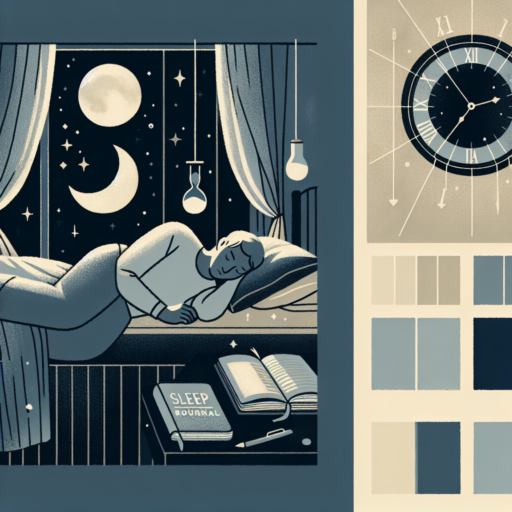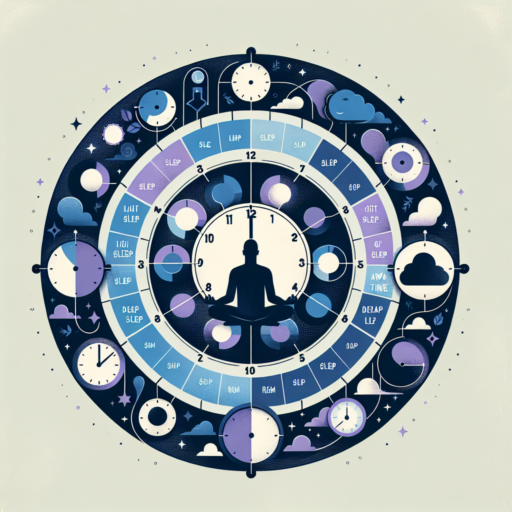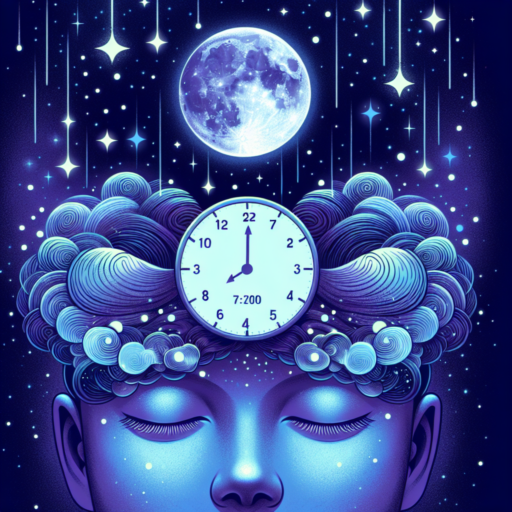Understanding the Concept of Sleep Record
Keeping a sleep record has become an essential aspect of understanding and improving our sleep patterns. In essence, a sleep record or sleep diary is a tool used to track various facets of one’s sleep cycle, from duration to disturbances, helping to pinpoint issues or trends that might affect sleep quality. This approach empowers individuals to make informed changes to their lifestyle or habits that could lead to a more restorative night’s sleep.
At the core of a sleep record, you will find data points such as the time you go to bed and wake up, the total amount of sleep you get, any naps taken during the day, and subjective ratings of sleep quality. Over time, this collected data offers invaluable insights into your unique sleep architecture and how it is influenced by your daily activities. For instance, you might notice that caffeine consumption post-3 PM significantly impacts your ability to fall asleep quickly.
Furthermore, sleep records can also help identify patterns related to sleep disorders such as insomnia or sleep apnea. By tracking symptoms and occurrences, individuals can provide healthcare professionals with concrete data, enhancing the diagnosing process and the effectiveness of prescribed treatments. Therefore, the act of maintaining a simple sleep diary could be a transformative step towards achieving better sleep health.
How to Accurately Track Your Sleep Pattern
Tracking your sleep pattern is essential for understanding and improving your sleep quality. With the advancements in technology, accurately monitoring sleep has become easier and more precise. From wearable devices to smartphone apps, various tools can help you understand your sleep cycle better and identify areas for improvement.
Choosing the Right Tools
To begin with, it’s crucial to choose the right tools for tracking your sleep. Wearable devices like smartwatches and fitness trackers are popular for their convenience and the ability to monitor your sleep automatically. They provide detailed insights into your sleep stages, movements, and even heart rate throughout the night. On the other hand, smartphone apps can offer a simpler approach, utilizing the phone’s accelerometer to track your sleep patterns. While they may not be as comprehensive as wearable devices, they are a good starting point for those looking to get a general idea of their sleep quality.
Analyzing Your Sleep Data
Once you have chosen your tracking method, the next step is to regularly analyze your sleep data. Look for consistent patterns or irregularities in your sleep phases, duration, and quality. Devices and apps often give scores or graphs that make this data easier to understand at a glance. By paying attention to these metrics, you can identify factors that may be disrupting your sleep, such as late-night snacking or screen time before bed. Recognizing these patterns is the first step towards adjusting your habits to improve sleep quality.
Improving your sleep quality requires more than just tracking; it involves making informed adjustments based on the data collected. By understanding your sleep pattern through accurate tracking, you’re equipped with the knowledge to make meaningful changes. Whether it’s adjusting your bedtime routine, changing your sleeping environment, or addressing stress and diet, the insights gained from tracking your sleep are invaluable in the quest for better rest.
The Importance of Recording Your Sleep for Better Health
Understanding and improving sleep quality is a critical component of maintaining overall health and well-being. Recording your sleep patterns is a key step towards achieving better health, as it helps reveal insights into your sleep habits and identify areas for improvement. This valuable data can uncover subtle nuances in sleep cycles and disturbances that might not be apparent without detailed observation.
Identifying Sleep Patterns
By actively recording sleep, individuals can identify recurring patterns and trends in their sleep behavior. This might include the duration of deep sleep, frequency of awakenings, and the amount of REM sleep obtained each night. Such detailed records can be pivotal in diagnosing sleep-related issues like insomnia or sleep apnea, enabling timely and effective interventions. Moreover, understanding these patterns empowers individuals to make informed lifestyle changes that can lead to substantially improved sleep quality.
Enhancing Lifestyle Modifications
Recording sleep data also guides the implementation of beneficial lifestyle modifications. For instance, one may discover that consuming caffeine or engaging in screen time before bed negatively impacts sleep quality. Armed with this knowledge, individuals are better positioned to adjust their nighttime routines, such as by adopting a more consistent sleep schedule or incorporating relaxation techniques before bed. These adjustments can significantly contribute to achieving a restorative night’s sleep, underscoring the importance of sleep tracking in personal health management.
Top Tools and Apps for Keeping a Detailed Sleep Record
In today’s world, where managing one’s sleep has become as crucial as managing one’s diet, finding the right tools for monitoring sleep patterns is invaluable. With a plethora of options available in the market, distinguishing the most effective tools and apps for keeping a detailed sleep record becomes essential. These digital aides not only help in tracking the quantity of sleep but also analyze the quality, offering insights into the deep, REM, and light sleep stages.
Essential Features to Look For
When searching for the perfect sleep tracking tool, certain features stand out as must-haves. A comprehensive tool should offer detailed analytics, including sleep duration, consistency, and efficiency. Other invaluable features include the ability to record environmental factors such as noise and light levels, which can significantly impact sleep quality. An app with a user-friendly interface and actionable insights can serve as a personal sleep consultant, guiding you towards improved sleep hygiene.
Leading Apps in Sleep Monitoring
- Sleep Cycle: Renowned for its precision and user-friendly design, Sleep Cycle utilizes sound analysis to monitor your sleep stages and offers detailed reports and insights into your nightly rest.
- Fitbit: Though primarily a fitness tracker, Fitbit’s sleep tracking features provide comprehensive insights into your sleep patterns, including sleep score, heart rate variability, and time spent in each sleep stage.
- Headspace: Best known for its meditation resources, Headspace also offers a specialized section for sleep that includes sleep tracking capabilities alongside guided meditations to help you unwind before bed.
Choosing the right tool or app from among the best for keeping a detailed sleep record depends on individual needs and preferences. Whether you’re interested in deep diving into your sleep analytics, seeking to improve your sleep environment, or looking for a holistic approach to better sleep, there’s an app designed to aid you in your journey. Embracing these tools can not only enhance your understanding of your sleep patterns but also significantly contribute to achieving better sleep quality and overall wellness.
Breaking Down the World Sleep Record: Facts and Insights
The quest to establish a world sleep record is not only a testament to human endurance and curiosity but also opens up a fascinating dialogue about the limits of the human body and the significance of sleep. Delving into the depths of this record, one encounters not just numbers, but stories of people pushing boundaries, alongside insights that challenge our understanding of the necessity and impact of sleep.
The Current Record and Its Holder
The officially recognized world sleep record as it stands is far more than a mere number. It embodies the culmination of preparation, determination, and the human capacity to extend beyond ordinary limits. This record is carefully documented and scrutinized to ensure authenticity and adherence to predefined criteria, reflecting the rigorous nature of record-setting endeavors.
Physiological and Psychological Effects
Embarking on a journey to break or establish a sleep record is not without its consequences. The human body and mind undergo significant stress during prolonged periods of sleep or sleep deprivation. Researchers emphasize the intricate balance required to maintain health and well-being throughout such attempts, highlighting the profound impact of sleep on psychological resilience and physical health. This pursuit, while fascinating, lays bare the essential functions sleep serves in restoring and rejuvenating the body and mind.
The Role of Sleep Records in Diagnosing Sleep Disorders
Sleep plays a crucial role in our overall health, making the diagnosis and management of sleep disorders a key area of concern for medical professionals. Sleep records, which meticulously document one’s sleep patterns and characteristics, stand out as invaluable tools in the intricate process of diagnosing sleep disorders. These records, often a combination of self-reported sleep diaries and data collected through polysomnography (PSG), provide a comprehensive overview of an individual’s sleep patterns, habits, and potential disruptions.
One of the primary benefits of utilizing sleep records for diagnosing disorders is the ability to identify patterns that are indicative of specific conditions. For example, the presence of abnormal movements or breathing patterns during sleep can suggest sleep disorders such as sleep apnea or restless legs syndrome. Additionally, the detailed information in sleep records can help distinguish between disorders that may have overlapping symptoms, such as insomnia and circadian rhythm sleep disorders, thereby enabling a more accurate diagnosis and tailored treatment plan.
Beyond the initial diagnosis, sleep records also play a pivotal role in monitoring the effectiveness of treatment strategies over time. Changes noted in subsequent sleep records can indicate whether a prescribed treatment is improving the patient’s condition or if adjustments need to be made. This dynamic aspect of sleep records underscores their importance not only in diagnosing but also in the ongoing management of sleep disorders, ensuring that patients receive the most appropriate and effective care.
Step-by-Step Guide to Maintaining a Personal Sleep Diary
Maintaining a personal sleep diary can be a transformative approach towards understanding and improving your sleep patterns. To get started, follow this step-by-step guide which emphasizes the simple yet effective methods of tracking your sleep, aiding in identifying trends and habits that impact your rest.
Getting Started with Your Sleep Diary
Begin by choosing a format for your diary that suits your preference, whether digital or paper. Record the date, bedtime, and wake-up time daily. Note the total sleep hours and assess the quality of your sleep on a scale from 1 to 10. This fundamental data collection is crucial for recognizing patterns or changes in your sleep routine over time.
Daily Observations to Include
Enhance your diary by documenting daily variables that influence sleep quality. Include details about your caffeine intake, exercise routines, and medication usage. Stress levels and significant events of the day should also be noted, as emotional states closely interact with sleep health. Remember, the more comprehensive your entries, the better insights you will gain.
Review and Adjust
Consistently maintaining your sleep diary enables you to gather ample data for review. Look for patterns such as what days you slept better and why that might be. Was it less caffeine consumption, more physical activity, or perhaps early bedtime routines? Identifying these patterns will allow you to make informed adjustments to your lifestyle, potentially leading to significant improvements in your sleep quality.
No se han encontrado productos.
Comparing Your Sleep Record with Healthy Sleep Standards
Understanding how your sleep patterns measure up against recognized healthy sleep standards is a pivotal part of maintaining overall wellness. The National Sleep Foundation outlines that adults should aim for 7-9 hours of quality sleep per night, but individual needs may vary. By comparing your sleep record—whether it’s a simple diary or data from a sophisticated sleep tracker—with these guidelines, you can identify discrepancies and areas for improvement.
Key Areas to Consider When Comparing Your Sleep
- Duration: The total number of hours spent sleeping is crucial. Falling short of the recommended 7-9 hours repeatedly can indicate a sleep deficit.
- Consistency: Going to bed and waking up at the same times every day, even on weekends, helps regulate your body’s internal clock and can improve sleep quality.
- Quality: Quantity is not the only measure; uninterrupted, deep sleep is essential. Frequent awakenings or feeling unrested upon waking might suggest poor sleep quality.
Moreover, tracking sleep patterns over time can reveal trends and shed light on how lifestyle choices—like exercise, diet, and screen time—impact sleep quality. It’s also worth noting how you feel during the day. Persistent daytime fatigue, despite getting an adequate amount of sleep, might point to issues with sleep quality or undiagnosed sleep disorders.
Finally, leveraging the insights from your sleep comparison can guide necessary adjustments to your sleep habits, environment, or signal the need for a professional consultation. Addressing sleep problems is not just about meeting numbers but ensuring the sleep you get is genuinely restorative and aligns with healthy sleep practices.
Expert Tips for Improving Your Sleep Quality Based on Sleep Data
Improving sleep quality is a journey unique to each individual, yet certain expert tips, backed by sleep data, can guide us toward better rest. Insights derived from comprehensive sleep studies have pointed us towards actionable strategies that can enhance the quality of our sleep, directly impacting our daily performance, mood, and overall health. These tips center around optimizing our bedroom environment, establishing a pre-sleep routine, and understanding the pivotal role of diet and exercise.
Optimizing Your Sleep Environment
Studies have consistently shown that the quality of your bedroom environment significantly affects how well you sleep. Key factors include temperature, noise levels, and light exposure. Experts recommend maintaining a cool, quiet, and dark room to signal your body it’s time to wind down. Investing in a good quality mattress and pillows that support your body’s natural sleeping posture can also make a substantial difference in improving sleep quality.
Establishing a Pre-sleep Routine
Creating a calming pre-sleep routine is another effective strategy backed by sleep data. Engaging in relaxing activities such as reading, taking a warm bath, or practicing meditation can help prepare your mind and body for rest. Limiting exposure to screens and avoiding stimulating activities an hour before bed can significantly improve the quality of your sleep, allowing your brain to naturally transition to sleep mode.
The Role of Diet and Exercise in Sleep Quality
Finally, what you eat and how much you exercise can profoundly impact your sleep. Research suggests that consuming a balanced diet rich in fruits, vegetables, and lean proteins, while limiting caffeine and sugar intake, particularly in the hours leading up to bedtime, can enhance sleep quality. Regular exercise, meanwhile, not only boosts your overall health but can also contribute to deeper, more restorative sleep. However, it’s advised to avoid vigorous workouts close to bedtime as they may keep you from falling asleep.
How Sleep Records Can Help You Achieve Deep Sleep More Consistently
Wakefulness during the night or feeling fatigued despite sleeping can be frustrating experiences. These could be signs that you are not getting enough deep sleep. Deep sleep is crucial for physical recovery, emotional regulation, and cognitive function. Maintaining sleep records can be an effective strategy to enhance the quality of your sleep. By tracking your sleep patterns, you can identify behaviors or factors that may be disrupting your sleep cycle. This information is pivotal for implementing changes to achieve deep sleep more consistently.
Spotting Patterns and Irregularities
By keeping a regular sleep diary, you can start to notice patterns or irregularities in your sleep habits that may be affecting your ability to reach or maintain deep sleep. For instance, you might discover that consuming caffeine after a certain time in the afternoon correlates with nights of poorer sleep quality. Recognizing these patterns allows you to make targeted changes in your behavior, such as adjusting your caffeine intake or modifying your bedtime routine, to promote better sleep hygiene and a deeper sleep state.
Sleep records not only help in identifying detrimental habits but also in tracking progress over time. By systematically recording sleep duration, quality, and disturbances, you can evaluate the effectiveness of the changes you implement. This ongoing assessment can encourage adherence to positive sleep practices, as you visually appreciate improvements in your sleep patterns. Furthermore, these records can be valuable information to share with healthcare professionals if sleep problems persist, facilitating a more informed and efficient approach to diagnoses and treatments.
Understanding your sleep patterns through detailed records is a powerful step towards optimizing your sleep health. By identifying issues and making informed adjustments, you can enhance your ability to achieve deep sleep more consistently. This is not just about increasing the number of hours you sleep but improving the quality of sleep to support your overall health and well-being.




